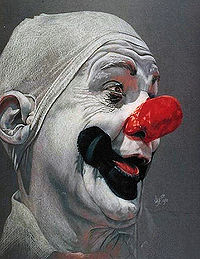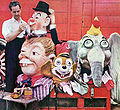Paul Jung
From Circopedia
Clown
By Dominique Jando
Paul Jung was born March 18, 1900 in Dayton, Ohio, the son of Paul and Mary Young, who were already in show business. Young Paul debuted on stage at age eight, performing an acrobatic dancing act with his brother on the vaudeville circuit. He joined the Ringling Bros. Circus in 1917, when he was seveteen years old, working there as an acrobat, and he remained with the show when the Ringling brothers combined it with the Ringling-owned Barnum & Bailey Circus the following year. He would be working for the Ringling organization, with The Greatest Show On Earth and other Ringling-owned circuses, for nearly half a century.
It has been said that Paul Jung began performing as a clown in 1935, but his draft card, issued in 1918, gives his occupation as "Clown" and his employer as Barnum & Bailey Circus. So he actually started clowning at eighteen, a very young age, but he had good role models in The Greatest Show On Earth’s Clown Alley, and in time would work alongside Lou Jacobs and Felix Adler, whose faces and silhouettes were already becoming icons of American clowning. Lou Jacobs may have inspired the highly imaginative Paul Jung with creating props and accessories—which would eventually lead him to becoming producing clown(American) In the traditional American circus, the head of Clown Alley, who imagines and produces gags for the other clowns in the show. for the Ringling show.
Jung met his wife, Elsie, an equestrian and aerialistAny acrobat working above the ring on an aerial equipment such as trapeze, Roman Rings, Spanish web, etc., while working with the Ringling-owned Hagenbeck-Wallace Circus in 1943. When not on the road, Paul and Elsie settled in Tampa, Florida, where Jung established his "Laugh Factory," in which he built props for the Ringling productions and for other circuses and ice shows. Some of the clown gags and props he imagined and built in his "factory" became classics of American clowning—such as The Adam Smasher (a machine that transformed a giant clown into several identical midget clowns…), the steam roller that flattens clowns, and Fireman, Save My Baby!, immortalized by Walt Disney in his animated feature, Dumbo.
A tragic Ending
Toward the end of his career, Paul Jung spent more time backstage than in the ring, supervising the clowns and preparing for them his sometimes-gigantic props. He was a very discreet person, highly regarded and well loved in the circus community. Yet his life ended in tragedy. On April 21, 1965, during Ringling Bros. and Barnum & Bailey’s engagement at Madison Square Garden in New York, Paul Jung was found murdered in his hotel room, his hands tied behind his back. There was no apparent motive for the murder, which puzzled his circus colleagues as much as it saddened them. A few weeks later, the Police arrested a suspect, a drug addict who was eventually convicted of the murder.
Sadly, this was the only time Paul Jung made the newspapers’ headlines; if his face was familiar to millions, his name, like that of most of the American clowns of the period, was by and large unknown. He is nonetheless well remembered by circus folks and circus enthusiasts, and his clown image has inspired many artists, even long after his death. His widow, Elsie, kept the "Laugh Factory" alive well into the 1970s, renting its vast collection of props to various shows. In 1992, Paul Jung was inducted into the International Clown Hall of Fame in Baraboo, Wisconsin—which is fittingly located in the vicinity of the old Ringling Bros. Circus’s winter quarters (today the Circus World museum), where Paul began his circus career.








